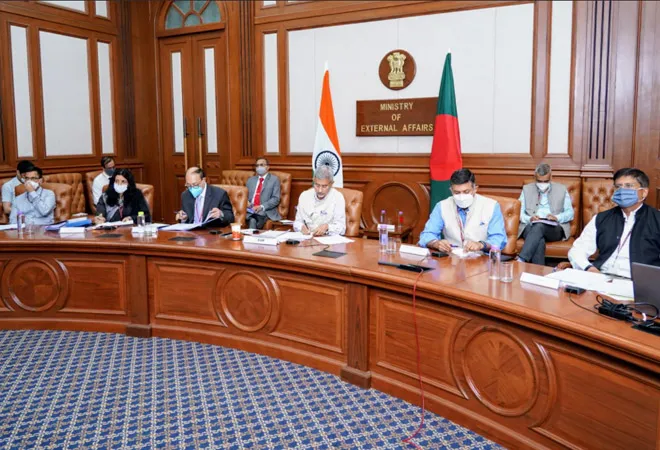-
CENTRES
Progammes & Centres
Location
The meeting has paved way for further interaction among the top leadership of the two countries.

With the sixth round of the Bangladesh-India Foreign Ministers’ consultative meeting on 29 September, the bilateral relationship between the two neighbours has got a major boost. Normally, the meeting takes place alternately in Dhaka and New Delhi and this time, it was scheduled to be held in the Bangladesh capital. However, owing to the ongoing Covid-19 pandemic situation, the meeting was held on the virtual platform, jointly chaired by Bangladesh’s Foreign Minister Dr A.K. Abdul Momen and Indian External Affairs Minister Dr S. Jaishankar. The meeting provided an opportunity for the two sides to review the developments in bilateral relations, and it suggested steps for further strengthening the relationship.
The meeting was significant as it spiked speculation on strains in the relationship in the aftermath of India implementing the National Register of Citizenship (NRC) and Citizenship Amendment Bill (CAA), which led to popular resentment in Bangladesh. Also, the growing Chinese engagement with Bangladesh gave additional ground for such a perception. In this background, the virtual meeting was a reassurance to the close ties between two countries and their commitment to consistently work towards enhancing the warmth and friendship.
India and Bangladesh are tied together by a bond of common culture, history and language. One such bond was the ‘Bangladesh Liberation War’ — in which India not only provided humanitarian support to the people of Bangladesh by hosting millions of refugees on its soil, but also had boots on the ground. This year marks the golden jubilee of the liberation war, a moment that demands joint celebration. Given the importance of the occasion, the meeting was timely to discuss the ways to celebrate the momentous occasion.
The joint statement, issued after the meeting, detailed various issues discussed, including trade and economic relationship, developmental partnership, resolution of the Rohingya refugee situation, terrorism, and water-sharing from common rivers. The celebration of the golden jubilee of the Liberation War too received significant attention.
A notable feature related to the joint jubilee celebrations was that it included celebrations not only in the two countries but also in select third nations. The meeting decided to jointly host some of the programmes, including the ceremonial military parades in Dhaka, New Delhi/Kolkata, on 16 December, the revival of the historic Mujibnagar-Kolkata road with the inauguration of Swadhinota Shoroni and the establishment of a permanent immigration check-post at Mujibnagar.
Other programmes include a Friendship Fair or Milon Mela with the collaboration of the two border guard forces, hosting of seminars in different cities of Bangladesh and India with the participation of the civil society, intelligentsia and war veterans of 1971, and launching of a website on 50 years of victory and friendship, which will have documents of relevance to the 1971 victory for public access.
Another important development has been the decision to establish a High-Level Monitoring Committee headed by the Secretary, Economic Relations Division from the Bangladesh side and the Indian High Commissioner in Bangladesh to regularly review the progress in the implementation of various projects under India’s Line of Credit. Bangladesh is the highest recipient of India’s developmental assistance abroad.
Given the importance on the need for enhancing cooperation on water-related issues, the two sides reiterated their commitment to the finalisation of the Interim Agreement for sharing of the waters of the Teesta, pending since 2011. The meeting also highlighted the necessity for the early conclusion of the Framework of Interim Agreement on sharing of waters of six other rivers, namely, Manu, Muhuri, Khowai, Gumti, Dharla and Dudhkumar.
Further, to tackle the economic fallout of the Covid-19 at the global and regional levels, the two countries expressed the need for leveraging resources in the two major regional organisations, SAARC and BIMSTEC. Bangladesh had also sought India’s support for strengthening cooperation under the Indian Ocean Rim Association to ensure maritime safety and security in the Indian Ocean Region.
Emphasising the need to resolve the Rohingya refugee crisis, India and Bangladesh stressed on the importance of their safe, speedy and sustainable return to Myanmar. Nearly a million Rohingyas, the inhabitants of Rakhine state in Myanmar, are residing in Bangladesh since 2017 after they fled their country following the repression unleashed by the Myanmar security forces.
In the meeting, Bangladesh’s Foreign Minister expressed apprehension about the growth of pockets of radicalism if the repatriation of the Rohingya refugees are delayed further. The lingering of the issue may hamper peace and stability of the region, the Minister said, seeking India’s help in this regard.
The meeting added a new momentum to the bilateral relationship. The meeting has paved way for further interaction among the top leadership of the two countries. Prime Minister Narendra Modi and Prime Minister Shiekh Hasina are likely to hold a virtual summit in December this year.
Close cooperation between India and Bangladesh, the two growing economies of South Asia, could significantly contribute to the peace and development of the region.
The views expressed above belong to the author(s). ORF research and analyses now available on Telegram! Click here to access our curated content — blogs, longforms and interviews.

Joyeeta Bhattacharjee (1975 2021) was Senior Fellow with ORF. She specialised in Indias neighbourhood policy the eastern arch: Bangladeshs domestic politics and foreign policy: border ...
Read More +